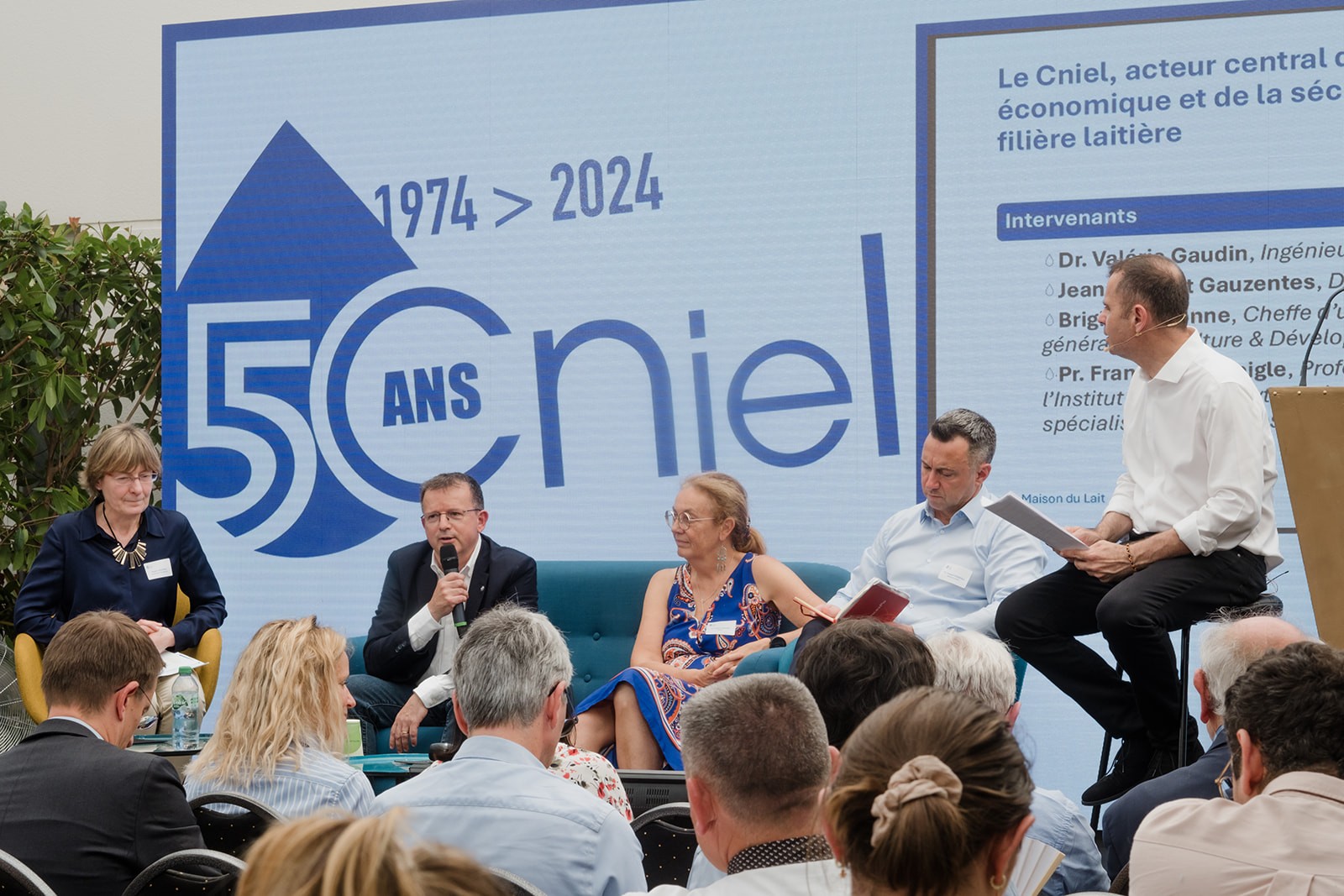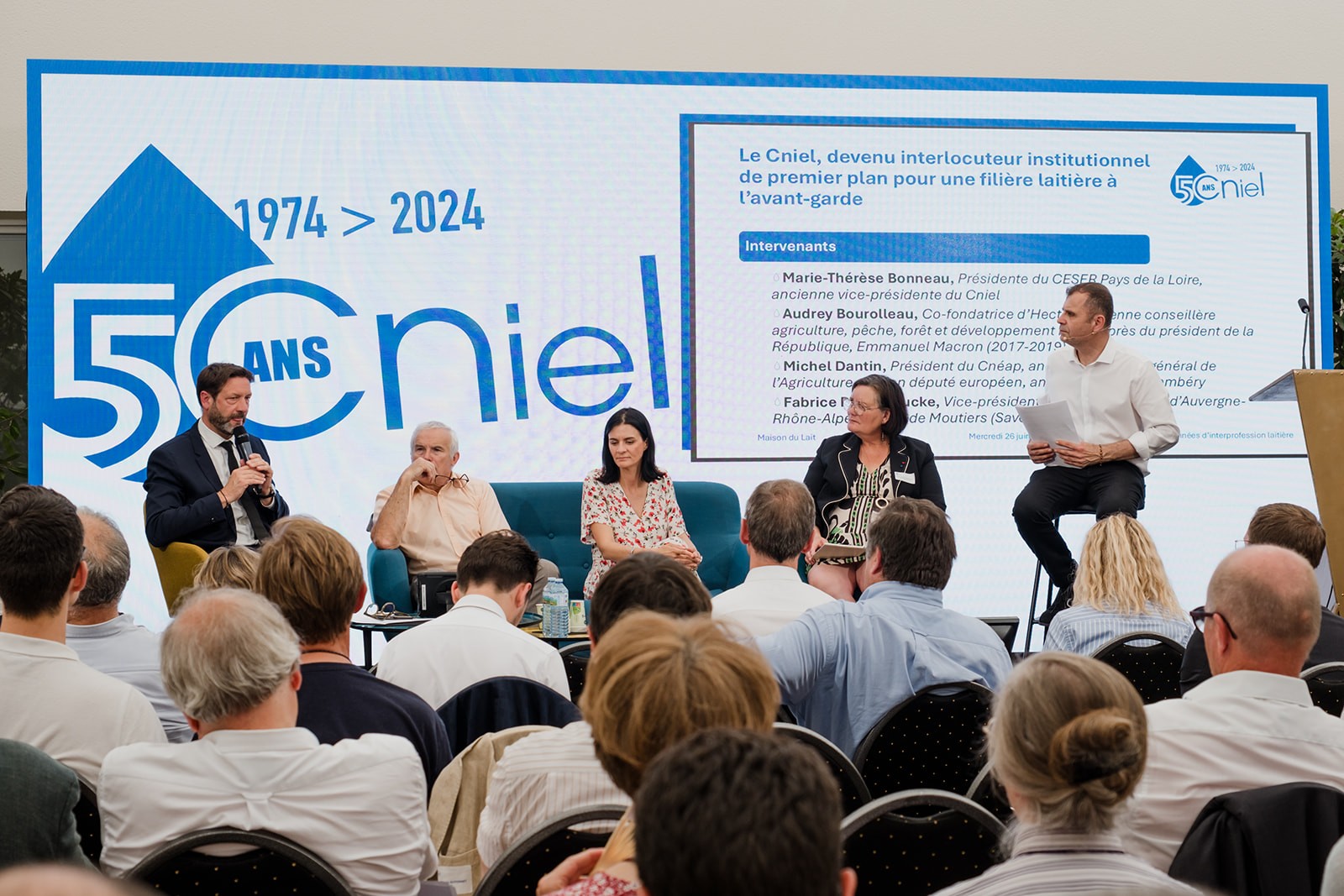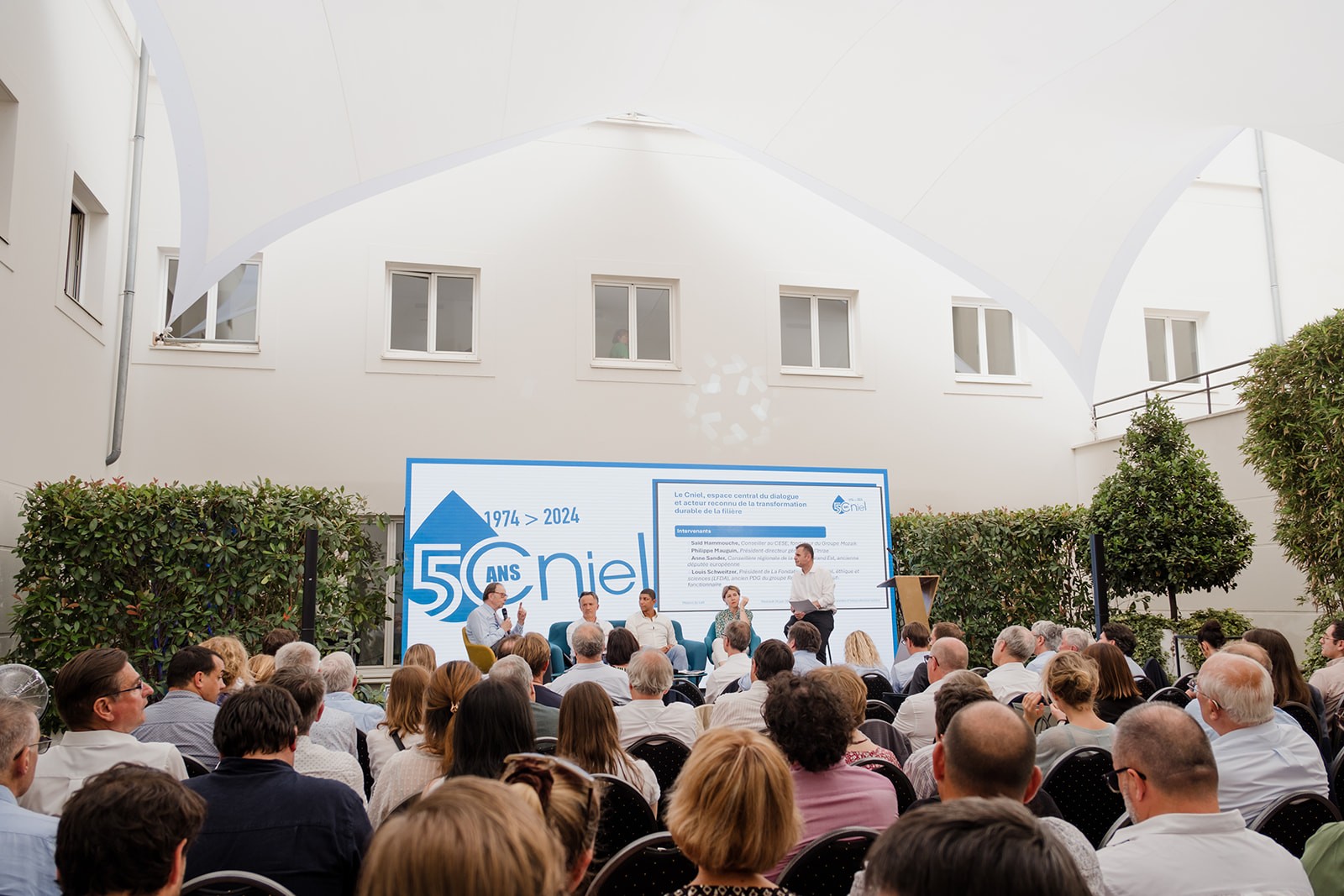
Cniel: a key player in the sustainable transformation of the dairy sector
As society evolves and consumer expectations change, the dairy sector adapts and anticipates these new demands. At the heart of this dynamic, the Centre National Interprofessionnel de l’Économie Laitière (Cniel) provides a forum for dialogue, where answers to the challenges of today and tomorrow can be found. On the occasion of the 50th anniversary of Cniel, we reflect on building a future where the attractiveness of professions, social inclusion, animal welfare and sustainability go hand-in-hand.Attractiveness and generational renewal
The aging of the farming population is a major issue in France, as well as in Europe. « Only 11% of European farmers are aged under 40, while almost 60% are over 55, » explains Anne Sander, who helped draw up the 2023 European Parliament report on generational renewal in the EU farms of the future. « This is a reality shared by a majority of EU countries: the farming population is aging and generational renewal is insufficient. This demographic imbalance poses a major risk for the future of farming in Europe,» sums up the former MEP.
The report proposes a number of measures to attract young people to the farming profession: increased financial aid to encourage start-ups, reinforced training and retraining programmes, simplification of administrative procedures, etc. To ensure a sustainable future for farms, the report stresses the importance of guaranteeing stable, competitive incomes for farmers.
Although the report was adopted unanimously by the European Parliament, to date, no concrete legislative measures have been adopted to remedy the situation. It should be noted that many aspects of the issue are more a matter of national policies and regulations, rather than Community prerogatives. For example, the report stresses the need to adapt the regulatory framework to facilitate access to land and the transfer of farms, issues which are highly specific to each member state.
The question of attractiveness is therefore a complex one, requiring a response at multiple levels while embracing a global view of the sector, insists Anne Sander: « We urgently need to make agricultural professions more attractive, particularly for producers, but also for all of the other dairy-related professions, such as processing and marketing. »
The report proposes a number of measures to attract young people to the farming profession: increased financial aid to encourage start-ups, reinforced training and retraining programmes, simplification of administrative procedures, etc. To ensure a sustainable future for farms, the report stresses the importance of guaranteeing stable, competitive incomes for farmers.
Although the report was adopted unanimously by the European Parliament, to date, no concrete legislative measures have been adopted to remedy the situation. It should be noted that many aspects of the issue are more a matter of national policies and regulations, rather than Community prerogatives. For example, the report stresses the need to adapt the regulatory framework to facilitate access to land and the transfer of farms, issues which are highly specific to each member state.
The question of attractiveness is therefore a complex one, requiring a response at multiple levels while embracing a global view of the sector, insists Anne Sander: « We urgently need to make agricultural professions more attractive, particularly for producers, but also for all of the other dairy-related professions, such as processing and marketing. »
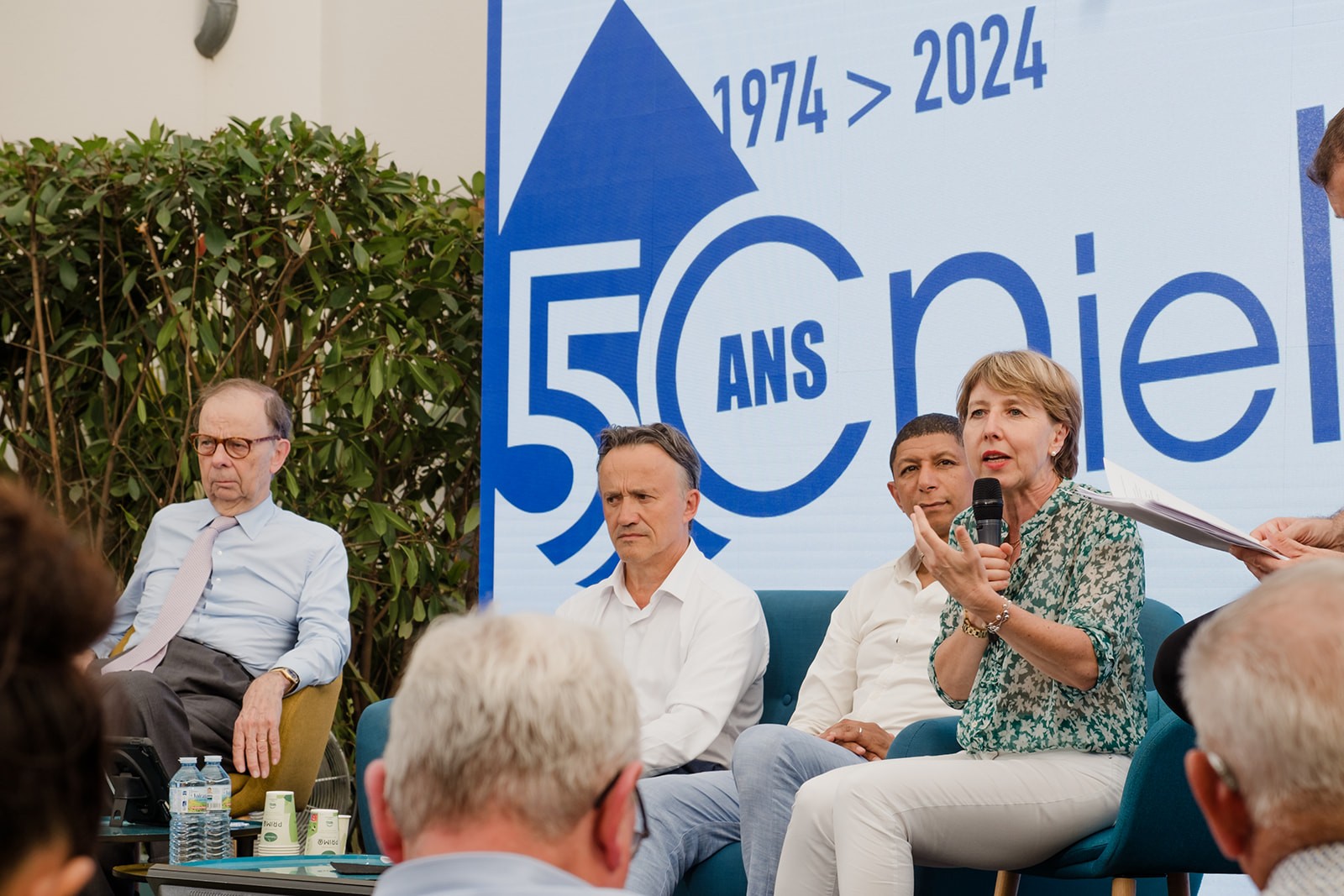 Guillaume Blanchon
Guillaume BlanchonEconomic inclusion: a win-win strategy
To meet the challenges of attractiveness and generational renewal, the dairy sector can direct part of its efforts towards economic inclusion. « It’s all about connecting people traditionally excluded from the job market with the professional opportunities available, explains social entrepreneur Saïd Hammouche. This principally concerns people from under-privileged areas, both urban and rural. »
In addition to reducing unemployment, applying this principle to the dairy sector would facilitate generational renewal and also enrich the sector by attracting men and women from diverse backgrounds, bringing with them new skills and perspectives. These new entrants could bring the energy and innovation essential to modernising the sector.
To deploy this strategy effectively in the dairy sector, Saïd Hammouche, founder of Groupe Mozaïk and advisor to the French (CESE ) (Economic, Social and Environmental Council) recommends certain adaptations: « We need to adapt communication and recruitment tools to be accessible and understandable by the target populations, and prepare candidates so that they can meet the specific needs of the sector. Mentoring schemes could help new talent to integrate and progress. »
Traditional recruitment criteria also need to be reconsidered. « We need to stop focusing solely on CVs and start looking at candidates’ aptitudes and life experiences, urges Saïd Hammouche. Behavioural competencies and soft skills must also be valued. » Indeed, companies that recruit along these criteria are frequently more successful and manage to diversify their teams.
Saïd Hammouche also stresses the importance of mobilising specialist organisations to support companies in these inclusive approaches. « Small businesses in particular can find it difficult to manage inclusive recruitment processes while dealing with their other day-to-day priorities. It is therefore crucial to provide support in terms of pre-qualification and recommendations. »
At the sector level, the collaboration between Cniel and structures such as Mozaïk RH can serve as a model. « By working together, we can develop programmes that showcase the dairy sector’s professions and attract diverse talent. This integrated approach will create a more inclusive and dynamic environment, beneficial to the entire sector, » concludes Saïd Hammouche, whose Mozaïk group also initiated the annual French economic inclusion summits.
In addition to reducing unemployment, applying this principle to the dairy sector would facilitate generational renewal and also enrich the sector by attracting men and women from diverse backgrounds, bringing with them new skills and perspectives. These new entrants could bring the energy and innovation essential to modernising the sector.
To deploy this strategy effectively in the dairy sector, Saïd Hammouche, founder of Groupe Mozaïk and advisor to the French (CESE ) (Economic, Social and Environmental Council) recommends certain adaptations: « We need to adapt communication and recruitment tools to be accessible and understandable by the target populations, and prepare candidates so that they can meet the specific needs of the sector. Mentoring schemes could help new talent to integrate and progress. »
Traditional recruitment criteria also need to be reconsidered. « We need to stop focusing solely on CVs and start looking at candidates’ aptitudes and life experiences, urges Saïd Hammouche. Behavioural competencies and soft skills must also be valued. » Indeed, companies that recruit along these criteria are frequently more successful and manage to diversify their teams.
Saïd Hammouche also stresses the importance of mobilising specialist organisations to support companies in these inclusive approaches. « Small businesses in particular can find it difficult to manage inclusive recruitment processes while dealing with their other day-to-day priorities. It is therefore crucial to provide support in terms of pre-qualification and recommendations. »
At the sector level, the collaboration between Cniel and structures such as Mozaïk RH can serve as a model. « By working together, we can develop programmes that showcase the dairy sector’s professions and attract diverse talent. This integrated approach will create a more inclusive and dynamic environment, beneficial to the entire sector, » concludes Saïd Hammouche, whose Mozaïk group also initiated the annual French economic inclusion summits.
 Guillaume Blanchon
Guillaume BlanchonAnimal welfare: responding to a growing consumer concern
« Animal welfare is an increasingly important issue for both consumers and industry professionals. Between 90% and 95% of French people believe it is necessary to improve the welfare of farm animals and would like more information about their living conditions. » These are the findings of Louis Schweitzer, President of the Fondation Droit Animal, Éthique et Sciences (the Animal Law, Ethics and Sciences Foundation, LFDA). (LFDA). To meet these expectations, the dairy sector must commit to transparency and continuous progress, an approach that could be supported by an « Animal Welfare »label, guaranteeing that purchased products meet high animal welfare standards. According to the former senior civil servant, « Such an initiative would make it possible to recognise the efforts of farmers and meet growing consumer demand for ethical products. »
To achieve this, traceability and transparency are essential, with animals monitored from birth to death, via robust traceability systems that ensure animal welfare conditions are respected at every stage. At the other end of the chain, it is crucial to inform consumers about these farming practices, using clear and reliable labels and certifications. « Improving farming conditions involves promoting practices that give animals more space and access to open air, such as grazing,» explains Louis Schweitzer, Grazing is already practised by around 80% of dairy farms in France! ». It’s also important to train farmers, particularly in gentle, respectful handling practices.
Research, innovation and collaboration play a key role in this dynamic. For example, working in partnership with NGOs and animal protection associations can help develop and implement ambitious animal welfare standards. « We’ve never worked with a professional or inter-professional organisation. My hope is that Cniel will achieve a first in this field,», enthuses the LFDA president.
But how can these qualities be promoted today? Through labelling and price. Consumers are prepared to pay more for products with guaranteed animal welfare, thus justifying a higher price and valuing the efforts of farmers. Integrating animal welfare into an overall strategy of sustainable competitiveness is essential to differentiate French products from low-cost imports. « For the time being, the right way to address animal welfare is to value the extra effort through the price paid by the consumer. »
Finally, improving animal welfare has a positive impact on the attractiveness of jobs in the dairy sector. Louis Schweitzer notes that « All studies show that there is a link between animal welfare and job satisfaction for farmers and employees. Animal-friendly practices make work more rewarding and attractive. » By ensuring animal welfare, the dairy sector is responding to societal expectations while strengthening the attractiveness of its professions. Beyond meeting ethical requirements, this commitment must be considered as a lever for the competitiveness and the sustainability of the sector.
To achieve this, traceability and transparency are essential, with animals monitored from birth to death, via robust traceability systems that ensure animal welfare conditions are respected at every stage. At the other end of the chain, it is crucial to inform consumers about these farming practices, using clear and reliable labels and certifications. « Improving farming conditions involves promoting practices that give animals more space and access to open air, such as grazing,» explains Louis Schweitzer, Grazing is already practised by around 80% of dairy farms in France! ». It’s also important to train farmers, particularly in gentle, respectful handling practices.
Research, innovation and collaboration play a key role in this dynamic. For example, working in partnership with NGOs and animal protection associations can help develop and implement ambitious animal welfare standards. « We’ve never worked with a professional or inter-professional organisation. My hope is that Cniel will achieve a first in this field,», enthuses the LFDA president.
But how can these qualities be promoted today? Through labelling and price. Consumers are prepared to pay more for products with guaranteed animal welfare, thus justifying a higher price and valuing the efforts of farmers. Integrating animal welfare into an overall strategy of sustainable competitiveness is essential to differentiate French products from low-cost imports. « For the time being, the right way to address animal welfare is to value the extra effort through the price paid by the consumer. »
Finally, improving animal welfare has a positive impact on the attractiveness of jobs in the dairy sector. Louis Schweitzer notes that « All studies show that there is a link between animal welfare and job satisfaction for farmers and employees. Animal-friendly practices make work more rewarding and attractive. » By ensuring animal welfare, the dairy sector is responding to societal expectations while strengthening the attractiveness of its professions. Beyond meeting ethical requirements, this commitment must be considered as a lever for the competitiveness and the sustainability of the sector.
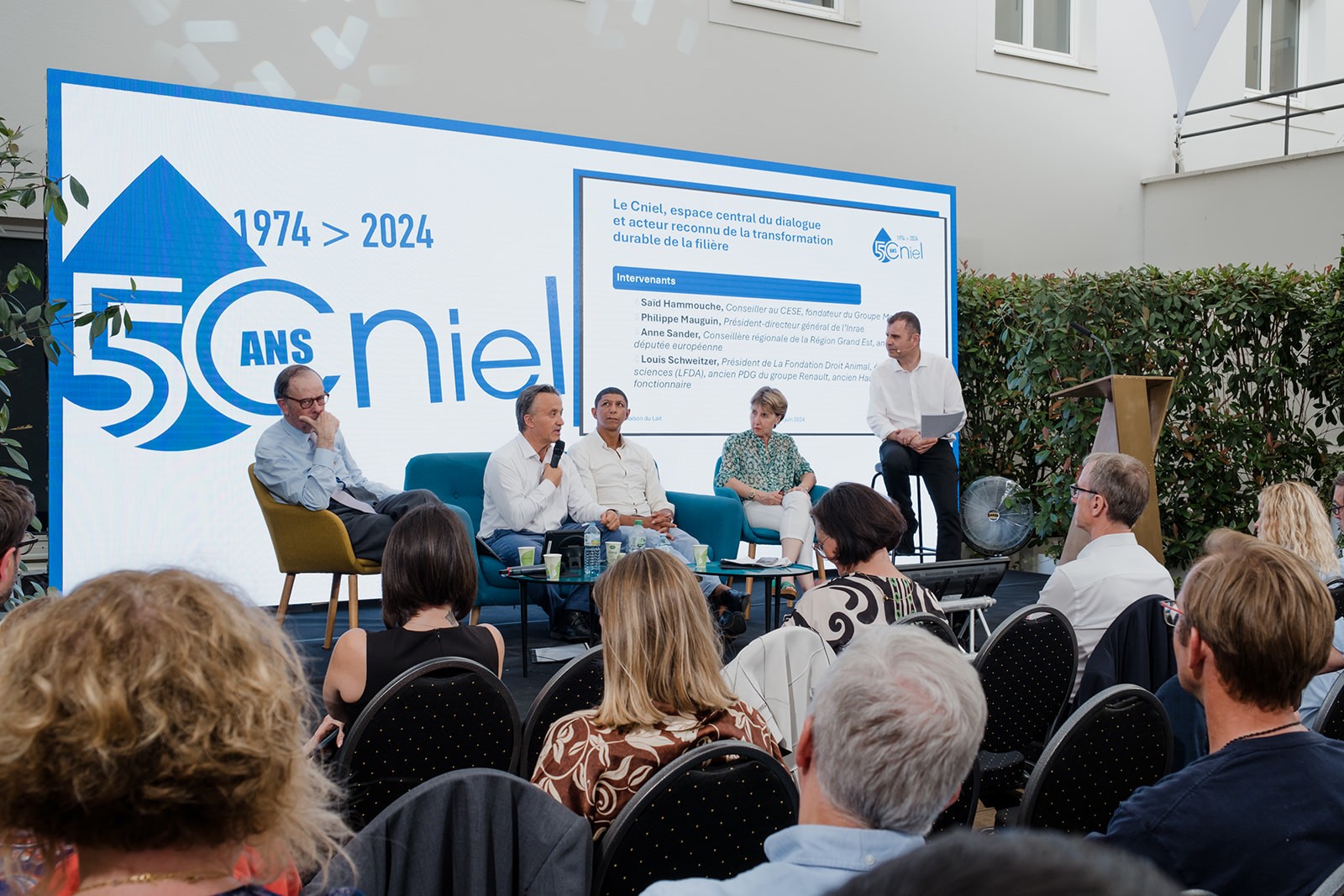 Guillaume Blanchon
Guillaume BlanchonResearch for sustainable livestock farming
Faced with the challenges of climate change and growing societal expectations around sustainability, adopting environmentally friendly agricultural practices is no longer an option, but a necessity to guarantee the long-term future of the sector. Cniel is therefore working with its partners to reduce greenhouse gas emissions and improve the sustainability of farming practices, without neglecting to highlight the essential role of livestock farming in a sustainable agricultural model.
It is known that ruminants, particularly dairy cows, produce the greenhouse gas methane during digestion. « We estimate that a 30% reduction in enteric methane emissions is possible over the next 15 to 20 years,» says Philippe Mauguin, President of the French National Research Institute for Agriculture, Food and the Environment, INRAE (Institut national de recherche pour l’agriculture, l’alimentation et l’environnement). «Research is underway to reduce these emissions through genetics, modifications to animal feed and changes in herd management. » These are crucial advances to make livestock farming more sustainable.
Improving farming practices also involves more efficient management of natural resources and a reduction in the environmental impact of farms, requiring closer integration between agricultural practices and natural cycles, according to the specialist: « We need to make the most of local resources, reduce dependence on external inputs and promote mixed crop-livestock systems. » These systems recycle nutrients, maintain soil fertility and diversify sources of income for farmers. Research and development play a crucial role in identifying and promoting these sustainable practices.
It is important to emphasise that, despite the environmental challenges, livestock farming remains an essential component of a sustainable agricultural model. Its contributions are considerable, from landscape management to biodiversity preservation and carbon sequestration in grasslands.
Scientific advances alone are not enough. Farmers, researchers, policy makers, consumers – « It is crucial to work together to develop policies and practices that support sustainable agriculture,» says Philippe Mauguin. By adopting these collaborative approaches and drawing on innovative solutions, the dairy industry can play a key role in the transition to a more sustainable and resilient agriculture.
Although the challenges facing the dairy sector are numerous, solutions do exist. Attractiveness, inclusion, animal welfare, sustainability – Cniel is developing responses to these issues by embracing a collective, proactive approach. In this way, the dairy interprofession is building the long-term future for the sector and guaranteeing the future of tomorrow’s dairy stakeholders.
It is known that ruminants, particularly dairy cows, produce the greenhouse gas methane during digestion. « We estimate that a 30% reduction in enteric methane emissions is possible over the next 15 to 20 years,» says Philippe Mauguin, President of the French National Research Institute for Agriculture, Food and the Environment, INRAE (Institut national de recherche pour l’agriculture, l’alimentation et l’environnement). «Research is underway to reduce these emissions through genetics, modifications to animal feed and changes in herd management. » These are crucial advances to make livestock farming more sustainable.
Improving farming practices also involves more efficient management of natural resources and a reduction in the environmental impact of farms, requiring closer integration between agricultural practices and natural cycles, according to the specialist: « We need to make the most of local resources, reduce dependence on external inputs and promote mixed crop-livestock systems. » These systems recycle nutrients, maintain soil fertility and diversify sources of income for farmers. Research and development play a crucial role in identifying and promoting these sustainable practices.
It is important to emphasise that, despite the environmental challenges, livestock farming remains an essential component of a sustainable agricultural model. Its contributions are considerable, from landscape management to biodiversity preservation and carbon sequestration in grasslands.
Scientific advances alone are not enough. Farmers, researchers, policy makers, consumers – « It is crucial to work together to develop policies and practices that support sustainable agriculture,» says Philippe Mauguin. By adopting these collaborative approaches and drawing on innovative solutions, the dairy industry can play a key role in the transition to a more sustainable and resilient agriculture.
Although the challenges facing the dairy sector are numerous, solutions do exist. Attractiveness, inclusion, animal welfare, sustainability – Cniel is developing responses to these issues by embracing a collective, proactive approach. In this way, the dairy interprofession is building the long-term future for the sector and guaranteeing the future of tomorrow’s dairy stakeholders.
This article is based on a Round Table organised on the occasion of the Cniel General Assembly held at the Maison du Lait in Paris, France, on 26 June, 2024. The round table was attended by:
- Anne Sander, Regional Councillor for the Grand Est Region, former Member of the European Parliament;
- Saïd Hammouche, Advisor to the CESE (Conseil économique, social et environnemental), founder of Groupe Mozaik;
- Louis Schweitzer, Chair of the Fondation Droit Animal, éthique et sciences (LFDA), former CEO of the Renault group, former senior civil servant;
- Philippe Mauguin, President and CEO of INRAE (Institut national de recherche pour l’agriculture, l’alimentation et l’environnement).
undefined 19/08/2024
undefined 09/09/2024


